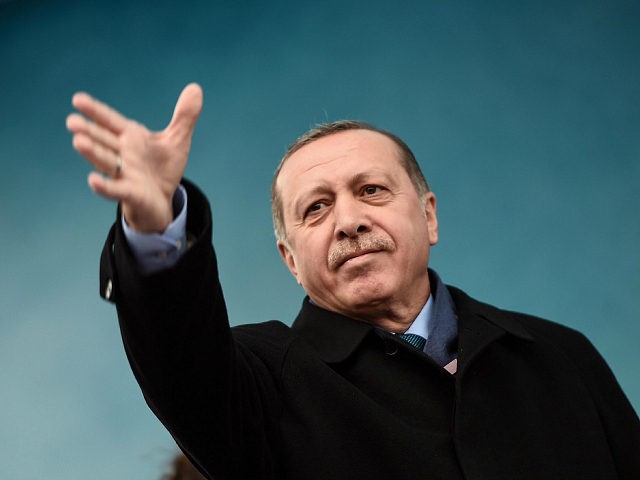Turkish President Recep Tayyip Erdogan will visit China, Russia, India, and the United States, as well as make stops in Europe during a world tour next month intended to rehabilitate his public image after a controversial referendum vote greatly expanded his executive power.
Turkey’s election oversight board announced that Erdogan’s attempt to convert the Turkish government from a parliamentary to a presidential system, granting him expanded powers and eliminating the office of the prime minister, was successful this week. An estimated 51 percent of Turks voted “yes” to the presidential system, while 49 percent voted “no.” Various opposition parties have asserted they have reason to believe the vote was fraudulent, a claim Erdogan denies and the Turkish election board rejected.
Following a controversial week in Ankara, the president announced he would be traveling around the world within the next month, landing in India on April 30 to talk trade with senior leaders there before heading to China and Russia. He will reportedly meet with Chinese President Xi Jinping and Russian President Vladimir Putin personally.
Erdogan will also have his first in-person meeting with American President Donald Trump and stop in Brussels to meet various European leaders during a NATO summit.
The state-run Anadolu Agency has published an infographic of his itinerary:

The report claims Erdogan will meet Trump to discuss, among other issues, Turkey’s demand for the United States to extradite Fethullah Gulen, an Islamic cleric exiled in Pennsylvania whom Ankara claims is the leader of a terrorist sect. Gulen runs a network of charter schools in the United States and has come under FBI investigation for fiscal mismanagement.
The last interaction between Trump and Erdogan occurred this week, when the heads of state spoke in a phone call regarding the Syrian civil war and President Trump congratulated Erdogan on the referendum victory.
“I believe Trump will do what President Obama failed to do in this regard,” Erdogan said in an interview on Thursday regarding Gulen’s potential extradition. “This terrorist leader is residing in a country, which is our strategic ally, and it is upsetting not only me but also the Turkish nation.”
“I think they will at least call him to account,” he argued.
While Trump congratulated Erdogan on the referendum, the major opposition parties in the country have refused to accept the election results. The largest opposition party, the secularist Republican People’s Party (CHP), filed a complaint before the Supreme Election Board (YSK) this week demanding an annulment of the election results. The office rejected the request, though the CHP and another minority party, the leftist pro-Kurdish People’s Democratic Party (HDP), have compiled a growing list of potential irregularities with the way the election was conducted.
Paramount among the list of complaints is the YSK’s decision to accept ballots from voting stations that had not been officially sealed by election staff, a decision that came down around midday, long after Turks began voting. The HDP claims hundreds of ballot boxes unverified through proper sealing means were counted as legitimate, potentially putting the “yes” vote over the 50-percent line.
In addition to ensuring international leaders maintain their relations with his government after the referendum, Erdogan has some fences to mend following diplomatic fallings-out with a number of European nations during the referendum campaign. Germany and the Netherlands refused to allow Erdogan officials to campaign for the “yes” vote within their territories to Turkish residents in Europe, leading Erdogan to accuse Germany of “Nazi practices” and call the Dutch leadership “Nazi remnants” and “fascists.” Erdogan may meet both country’s leaders in Brussels, where he will attend a NATO summit.

COMMENTS
Please let us know if you're having issues with commenting.